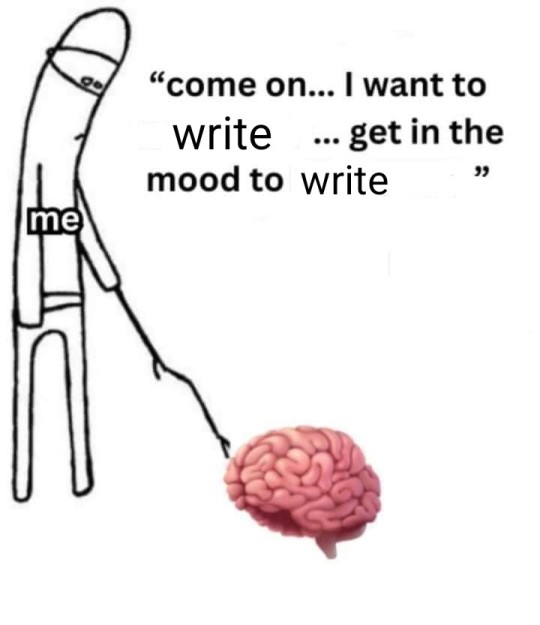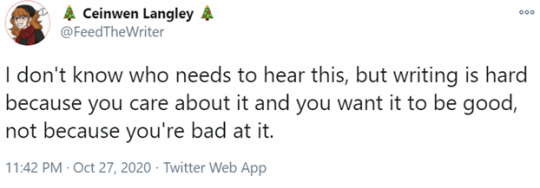Text
How fucking annoying is it when you feel so restless with creative energy but you can’t decide what to do with it and when you finally try to create something it comes out shit so you just give up and sit there being all creatively annoyed and jittery.
88K notes
·
View notes
Text
In writing, epithets ("the taller man"/"the blonde"/etc) are inherently dehumanizing, in that they remove a character's name and identity, and instead focus on this other quality.
Which can be an extremely effective device within narration!
They can work very well for characters whose names the narrator doesn't know yet (especially to differentiate between two or more). How specific the epithet is can signal to the reader how important the character is going to be later on, and whether they should dedicate bandwidth to remembering them for later ("the bearded man" is much less likely to show up again than "the man with the angel tattoo")
They can indicate when characters stop being as an individual and instead embody their Role, like a detective choosing to think of their lover simply as The Thief when arresting them, or a royal character being referred to as The Queen when she's acting on behalf of the state
They can reveal the narrator's biases by repeatedly drawing attention to a particular quality that singles them out in the narrator's mind
But these only work if the epithet used is how the narrator primarily identifies that character. Which is why it's so jarring to see a lot of common epithets in intimate moments-- because it conveys that the main character is primarily thinking of their lover/best friend/etc in terms of their height or age or hair color.
28K notes
·
View notes
Text
tragic fictional siblings... save me...
tragic fictional siblings
save me tragic fictional siblings
13K notes
·
View notes
Text
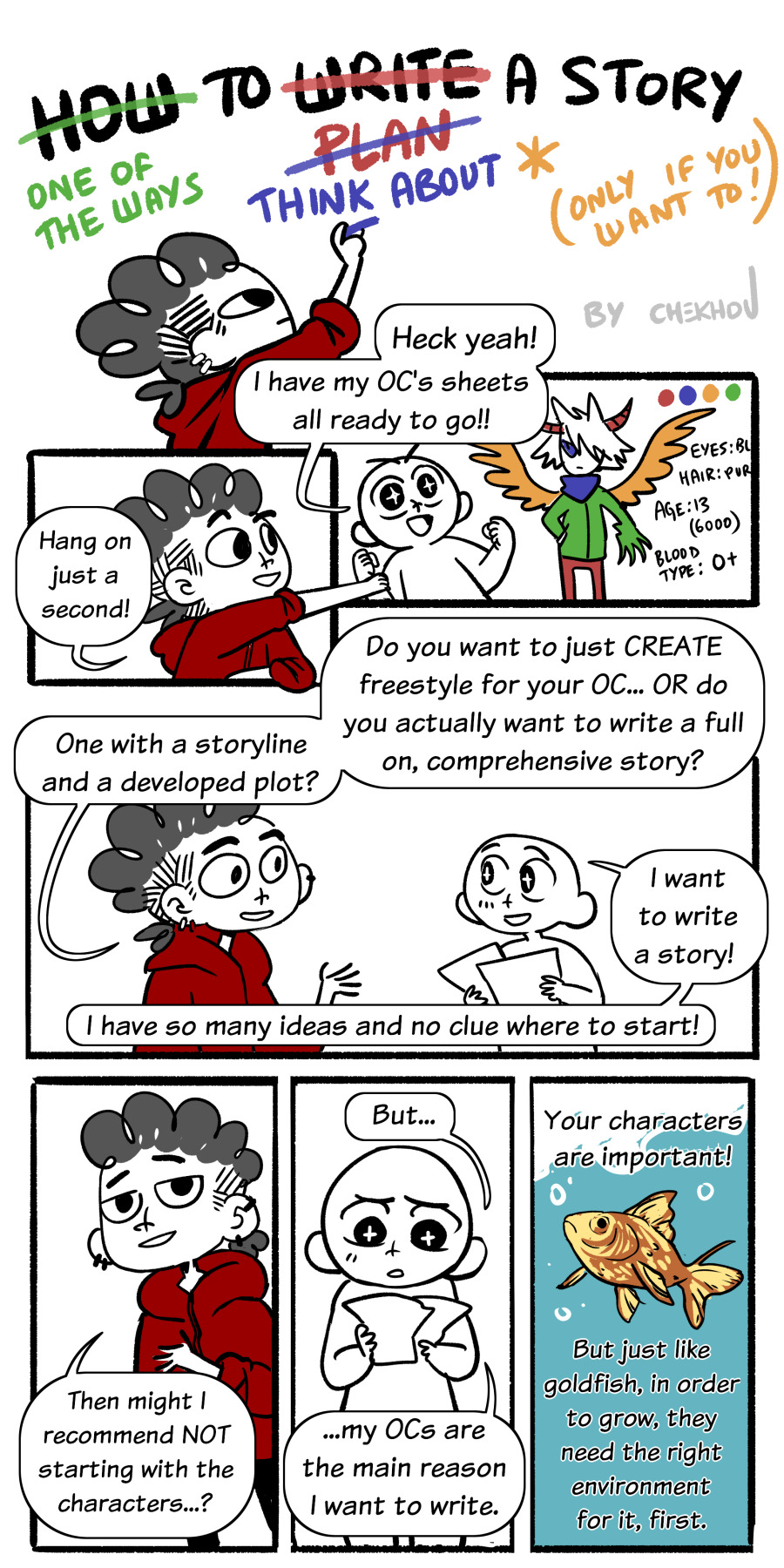
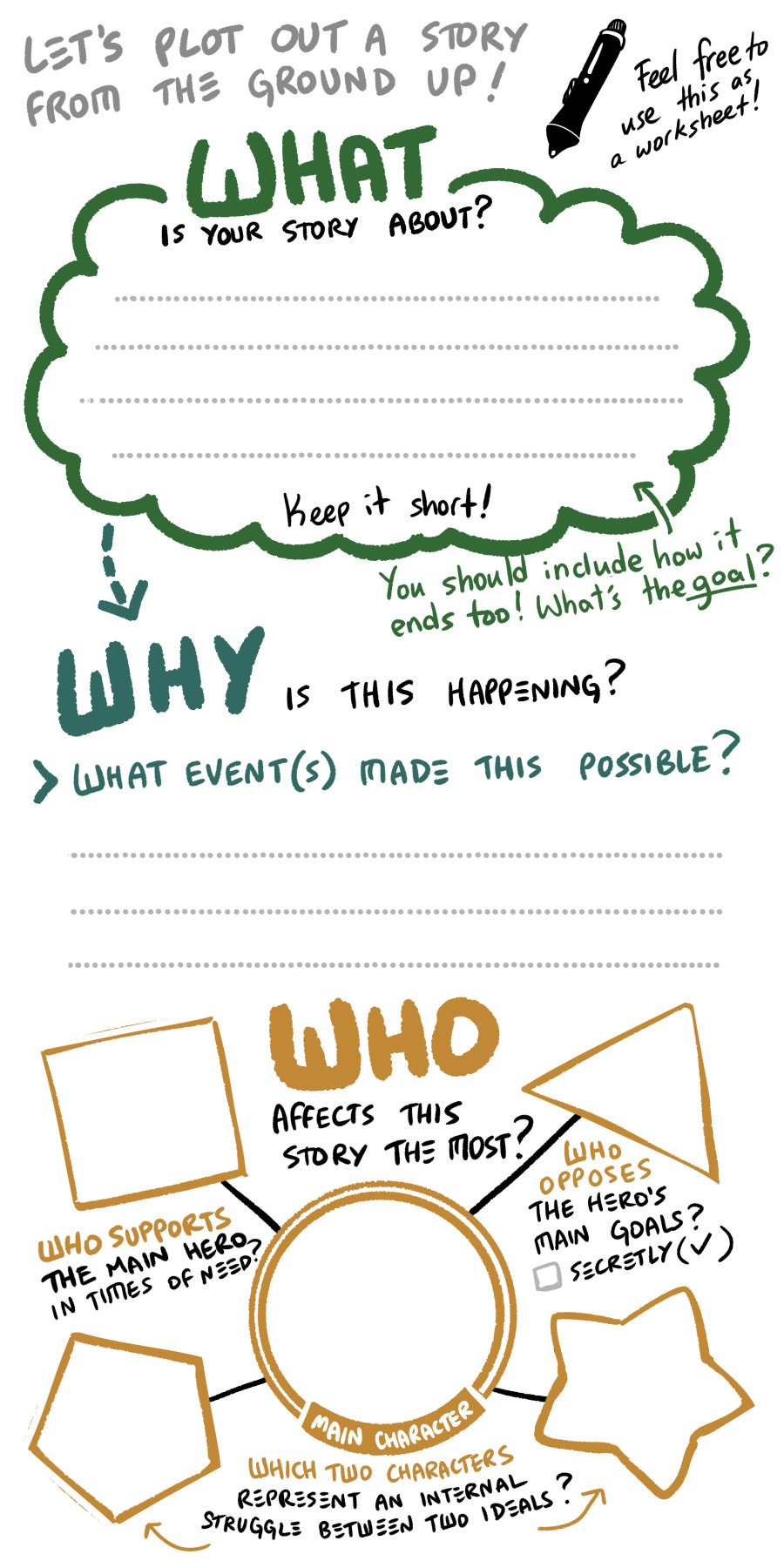
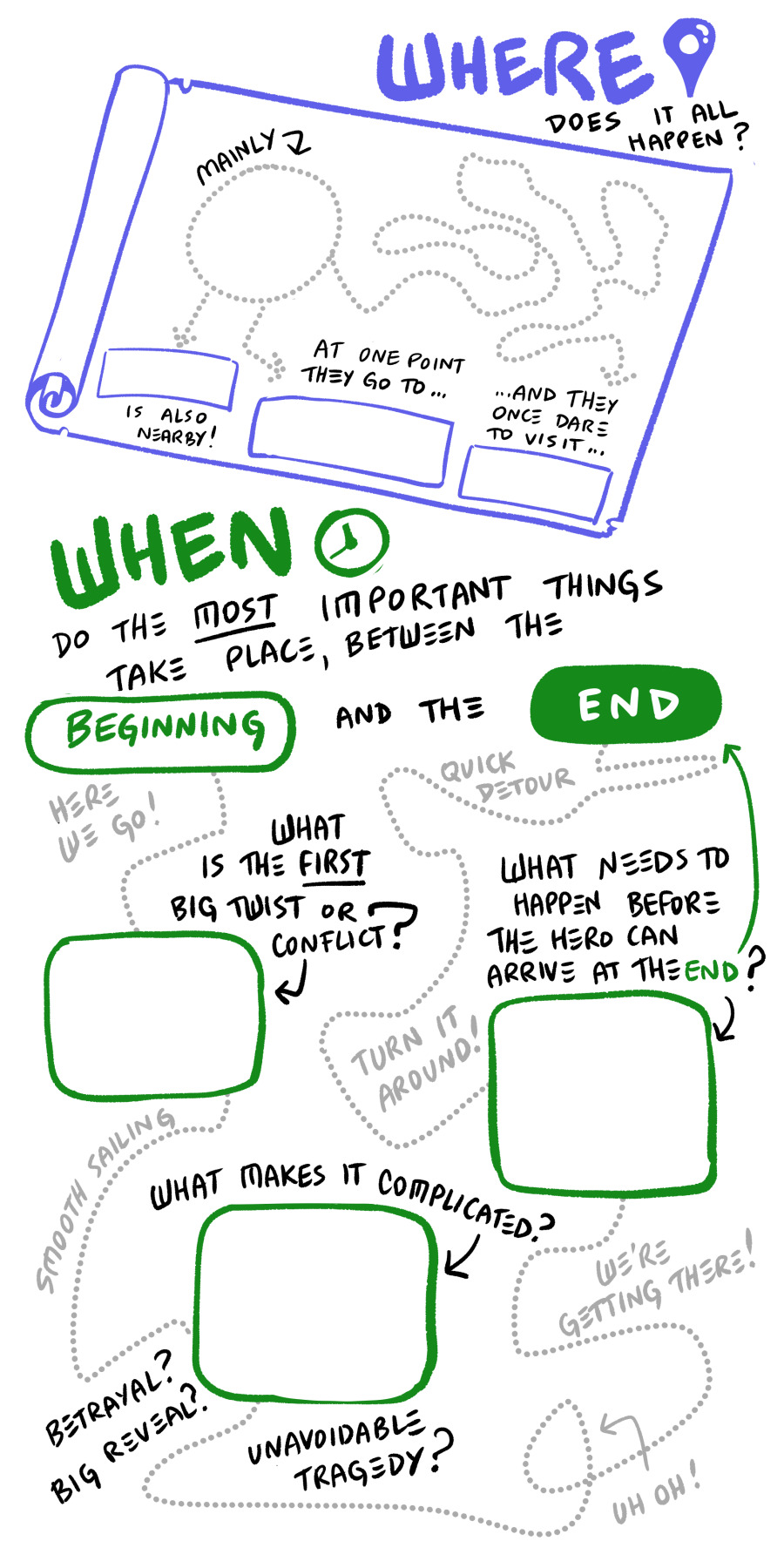
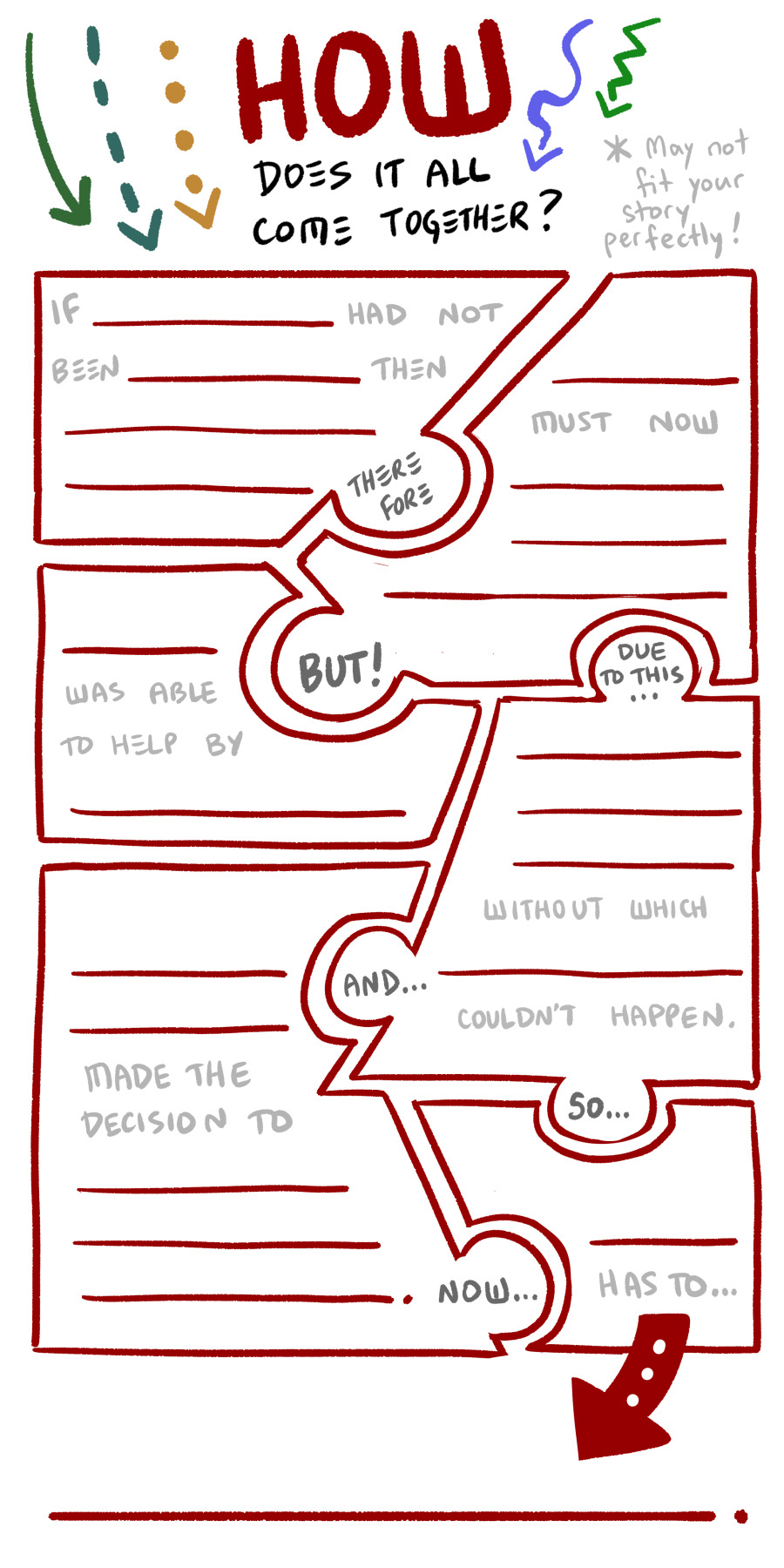
I've had this little idea in my head for a while now, so I decided to sit down and plot it out.
Disclaimer: This isn't meant to be some sort of One-Worksheet-Fits-All situation. This is meant to be a visual representation of some type of story planning you could be doing in order to develop a plot!
Lay down groundwork! (Backstory integral to the beginning of your story.) Build hinges. (Events that hinge on other events and fall down like dominoes) Suspend structures. (Withhold just enough information to make the reader curious, and keep them guessing.)
And hey, is this helps... maybe sit down and write a story! :)
23K notes
·
View notes
Text
Literally cannot emphasize enough that my #1 writing advice is to stop being afraid. Stop being afraid of sounding too cringe, or too stupid, or too horrifying, or too horny, or too weird, or too much, or too little, or too you. You need to put your entire pussy into your art. Sure, it won't be to everyone's tastes, but if you keep yourself to the blandest tamest safest roads possible you will be of no one's tastes, not even yours.
67K notes
·
View notes
Text
basic things you should know about your main characters
how is their relationship with their family
what are their beliefs, if they have any
what is their motivation (preferably something unrelated to their love interest/romantic feelings)
who were they raised to be vs. who they became/are becoming
what are their plans for the future, if they have any
how they feel about themselves and how it affects their behaviour
how do they feel about things they cannot control
and last but not least: Why is This Character the Protagonist??
8K notes
·
View notes
Text
I ❤️ self-loathing characters, characters who struggle with monstrosity (either fearing or embracing it), characters who are so lonely, who have a gaping hole in their chest, who bottle up & repress their feelings, who claw their way up & have ambitions, who fall down & lose everything, who search for identity & purpose yet can’t see themselves outside of what others want from or expect of them, who are hurt & hurt others, who long & grieve, who lie & pretend. characters who are messy & flawed & human
42K notes
·
View notes
Text
Writeblr Resources: Writing Realistic Scientists
This rant is brought to you by the sasquatch program I was listening to on the way home from work and how glibly it insisted that scientists were suppressing the evidence. While the theories that the sasquatch advocate threw out there were interesting in terms of story potential, they reminded me how few writers have a science background.
Personally, I have a BS in environmental science, i.e. being shuffled between the geography, biology, and chemistry departments for four years, and I’m currently employed as a microbiologist, so I do have that background. Have 10 (yes, 10) of my pet peeves.
1. The Omnidisciplinary Scientist, or as I like to call it, the comic book scientist. Scientists specialize heavily. You will get a grounding beyond the layperson’s high school coverage of fields related to yours if you go into a science, but it won’t be ALL fields of science. I have a less than high school level grasp of physics due to the fact that it was never required in my field. When you get really deep into technical stuff, however, two people in the same broad field might not know much about the other’s specialty. A particle physicist and an astrophysicist might only have a very basic grounding in each other’s experiments, though they’ve got a leg up on me in explaining them to each other.
A physicist telling a neuroscientist that they’ve discovered consciousness doesn’t read as good science, nor should you cite a dentist as a “scientist” in your argument about global warming.
2. Instant Results. CSI and other police procedurals are the primary culprits here, but also scifi tends to give people instant confirmation of what something is. Whether that’s germ identification, a blood test, or a chemical reaction, all experiments require setup time, controlled conditions, correct equipment, and analysis. If the machine does all the work in a few minutes, you don’t need a scientist.
For example: pregnancy tests used to take weeks, because urine samples from the potentially pregnant person had to be shipped to a lab, injected into frogs, and then the frogs had to be monitored to see if they released eggs. Now, you pee on a stick, because scientists spent years finding a quick chemical reaction (actually a change of reactions) that gave you a simple visible sign that specific hormones were present in your pee.
The frogs, presumably, are very relieved.
3. The insanely well-funded science lab. All experiments take money. Whether it’s for materials, equipment, or to pay an undergrad to count fruit flies every six hours, it’s just not plausible for most scientists to have every single piece of equipment they could ever need - and not all of the tools are publicly purchasable to begin with. My brother works with a biologist who has had to design a program to do statistics on bone shapes from almost scratch - when it’s done and they’ve published a paper on it, it will be publicly available, but until that happens, anyone who has to do the same analysis has to put years into developing the protocol themselves.
Also, as an example I’ve actually worked with, a Gas Chromatography Mass Spectrometer (a relatively common, if fancy, instrument in chemistry that can identify most chemicals with the right person running it,) can cost a hundred thousand dollars used. Routine maitenance (replacing a consumable part like the coil,) can cost hundreds of dollars, and if you use the machine more frequently you have to do it more frequently. And god forbid something goes wrong with the mechanical parts or the programming - it’s hardwired to a computer as old as your undergrad, and the last time they manufactured any replacement parts for the thing was 1986.
(If you want to hack one of these investment pieces of equipment by the way, forget about it - even something with a modern OS probably isn’t internet-enabled, as there is nothing that researchers hate more than waiting for an OS update before they can finish an experiment. Even relatively cheap instruments that run off a cheap modern laptop are pretty routinely debugged by having the wifi disabled, as nine times out of ten your program being messed up is because Windows updated. You have to physically go to the machine, put the files on a jump drive IF they are readable outside the program, and transfer them to something else. Or you can screenshot them and export the pics onto the jump file. Or copy them into excel and transfer the excel file.)
Addendum: hacking does not work like that. If you’ve seen it in a movie, it is either outdated in terms of computer science, or excessively dumbed down.
4. The Work dies with the scientist. If your work will be lost if you should meet with an unhappy fate, you are a supremely shitty scientist. First - very few fields that aren’t pure mathematics or computing can be undertaken solo. Academics have postdocs to do the analysis, grad students to do the specialized lab work, and undergrads to do the prep work. Businesses have PhD’s to do the final analysis, junior scientists to design and run experiments, and lab techs to clean up after them, and provide explanation for why the GCMS is disabled while windows updates. (Full disclosure: the reason I’m harping on this is because it happened to me with a spectrophotometer and I’m still not over whoever re-enabled the wifi.)
Also, though a company or secret shady government agency will not release your work for peer review the way an academic institution will, they will need the documentation of your work to file patents, or replicate it with the rest of their researchers.
If the field has merit and enough funding that other people will actually spend time on the same experiment, no one lone genius is the only person who could ever make a discovery. In fact, discoveries are independently replicated all the time, because most of them are enabled by other discoveries or new technology.
5. Absence of evidence is not evidence of absence. Science is a delicate balance between admitting that something *could* be happening and pointing out that just because I haven’t proven you wrong yet doesn’t mean that you’re right.
A plausible use of the absence of evidence: “We haven’t found any Higgs Bosons yet, but that does not mean that they don’t exist.” (As of 2013 they found some.) It’s plausible because all evidence suggested that the HB was possible, its existence strengthened longstanding theories that hundreds of people had failed to disprove and dozens of people had discovered supporting evidence of, and because it was something they could test for with the available technology.
An implausible use “We haven’t found any conclusive evidence of Sasquatches, but that doesn’t mean they don’t exist.” It’s implausible because we don’t have any credible evidence that they do exist - there is no longstanding theory or model that claims that the pacific northwest can support a significant population of bear sized hominid omnivores, and no plausible physical evidence that such creatures ever existed. It contradicts a whole host of theories in a lot of scientific disciplines: Ecology would posit that we would know about the role of such a large omnivore since they’d have a similar impact on local resources to an equivalent amount of bears, the recent fossil record and paleoarchaeology have yet to find any evidence that homonids other than anatomically modern humans have lived in north america, statistics would argue that if the creature is common enough and lives close enough to humans for sightings to ever be reported it would leave some evidence more credible than eyewitness testimony behind.
6. Contradiction is proof of being wrong. A single data point contradicting a theory is almost never an indication that the theory has been disproven. Science is done by humans, and mistakes are made. Similarly, a single success is not proof that you’re right. You need to do an experiment a lot to have enough data to be certain that what you think is happening is actually happening.
For example, those of you who took a statistics class can attest that just because you flipped a coin ten times and it landed on heads seven times doesn’t mean that you’re twice as likely to come up heads. You need to flip it a hundred times or more to have enough data to really do anything with it.
866 notes
·
View notes
Text
"having a crush can make you act a little crazy" fuck that y'all ever made original characters
25K notes
·
View notes
Text
Honestly? My main piece of advice for writing well-rounded characters is to make them a little bit lame. No real living person is 100% cool and suave 100% of the time. Everyone’s a little awkward sometimes, or gets too excited about something goofy, or has a silly fear, or laughs about stupid things. Being a bit of a loser is an incurable part of the human condition. Utilize that in your writing.
57K notes
·
View notes
Text
Some of my writer’s block cures:
Handwrite. (If you already are, write in a different coloured pen.)
Write outside or at a different location.
Read.
Look up some writing prompts.
Take a break. Do something different. Comeback to it later.
Write something else. (A different WIP, a poem, a quick short story, etc.)
Find inspiring writing music playlists on YouTube. (Themed music, POV playlists, ambient music, etc.)
Do some character or story prompts/questions to get a better idea of who or what you’re writing.
Word sprints. Set a timer and write as much as you can. Not a lot of time to overthink things.
Set your own goals and deadlines.
Write another scene from your WIP. (You don’t have to write in order.) Write a scene you want to write, or the ending. (You can change it or scrap it if it doesn’t fit into your story later.)
Write a scene for your WIP that you will never post/add to your story. A prologue, a different P.O.V., how your characters would react in a situation that’s not in your story, a flashback, etc.
Write down a bunch of ideas. Things that could happen, thing that will never happen, good things, bad things.
Change the weather (in the story of course.)
Feel free to add your own.
14K notes
·
View notes
Text
“Writing is hard” I say as I continue to browse the internet, not attempting to write at all.
41K notes
·
View notes
Text
How to Write & Create Creatures
Here’s a list of quick tips when it comes to creating your fantasy (or horror) creatures!
1) Warp and combine already existing creatures. Be inspired by real life and mythologies— put a magical twist on an already existing animal. The “Nemean Lion” is a lion in Greek mythology whose fur is impenetrable. Medusa is a woman with hair of snakes.
2) Think outside the box. A creature doesn’t have to be inspired by only living things. Beauty and The Beast has talking tea cups and clocks. If your creature is organic, think beyond your typical animals: plants, insects, bacteria, diseases, amphibians, etc.
3) Use all five senses. You don’t have to use them all at once in a description, but as the author, you should be aware of these details!
Sight: What do they look like? What are their unique features? How big are they compared to a human?
Touch: Is their skin rough like leather or soft like silk? Do they bare hair, and is it matted or greasy?
Smell: what scents come with the creature? Does the fairy smell like freshly baked muffins? Does the zombie smell like rotten eggs?
Hearing: What sounds do they make? Not just verbally but as a whole (loud footsteps, crackling bones, labored breathing, twinkling of a wand, etc.)
Taste: If they’re a rotting creature, would the salty taste of decomposition fill the air? Or does the pretty little fairy bring back memories of childhood sweets to your protagonist.
“The creature let out a low snarl, the smell of rotten flesh hitting me long before it ever came into view. Its leather-like skin was matte compared its the thin strands of greasy hair that danced in the moonlight.”
4) What sustains the creature? Does it feed off of blood, flesh, or human emotions? Is there a type of meal it would prefer or does it eat anything?
5) What is your creature’s motivation? What necessities does it need to survive? Does it need shelter, food, and water? Vampires require blood. Outside of basic survival needs… is it in search of something more material? An item or a specific person?
6) What summons your creature? Does it appear when someone rubs a magical lamp? Does it wander aimlessly until a sound catches its attention? Does the smell of blood make the monster from within come out?
7) Leave room for your reader’s imagination. While you want to thoroughly paint the picture of your creature, don’t over-explain. Instead, leave some room for your audience to fill in the gaps with their imagination. This will truly make the reading experience more unique to the reader.
8) Give it weaknesses. A creature that has limitations and rules is a realistic one. Werewolves only turn on a full moon and are weak to silver. Holy water burns a demon’s skin, and vampires can’t go out in the daylight. Is there a string of words that could paralyze it? If it can’t be killed, what can hurt it? Can it be captured or trapped?
9) Make it hard to kill. If the creatures in your story are easily defeated, that means there is less tension and conflict. Does it have immense strength or skin that is impenetrable? Make your characters think and be clever in the face of an impossible situation.
10) Does it have a home? Where does it rest? Does it live in caves with its herd or does it sleep under the beds of children? Is it a wandering monster or one that lives in the trees of a magical forest?
Instagram: coffeebeanwriting
2K notes
·
View notes
Text
It is increasingly obvious that most people have no idea how to indicate an illness is slowly killing someone without making them cough up blood. Doesn’t matter what it is or if it has anything to do with your respiratory system, if you’re dying, you’re coughing up blood.
108K notes
·
View notes
Text
Ending your Novel
When ending your novel, there are a few things to consider.
You’ll want to build up tension during the climax, and wrap things up during the resolution. Don’t forget to conclude your main storyline and finish up your subplots as well.
There should be some room left for readers to interrupt things on their own, such as the fate of certain characters.
Not only is it important that your ending makes sense, but it should also evoke emotion.
Knowing how your novel will end sooner than later will help guide you to its finish without wandering too much on pointless scenes.
📚 Here are some endings you can consider:
1) The Classic Cliff Hanger
Done wrong, this can leave readers unsatisfied. But if it’s done carefully, it can leave your audience yearning for more. Your protagonist’s main quest/goal should be concluded by the end of your novel, but leaving questions unanswered or a problem unresolved can be an intriguing cliffhanger. Cliff hangers don’t have to be groundbreaking, they can be small.
For example, Katniss survives The Hunger Games (concluding her main goal) but by tricking the Gamemakers into allowing two victors, we are left wondering what the consequences will be. Not only that, but we question what will come of her relationship with Peeta as he painfully realizes all of Katniss’s affection towards him was simply for the cameras.
2) End where you started
In a symbolic circle of events, you could potentially end your story in the location where it began. However, now the protagonist has newfound strengths or knowledge and can reflect on how they started. This cyclical ending can also work with a mirrored scene (ex. starting and ending with a sword fight).
3) The What-If Ending
Instead of a direct cliffhanger, this conclusion focuses on leaving the ending up to the reader’s imagination. In The Giver, Jonas successfully leaves behind his town and approaches Elsewhere on a speeding sled. He is barely holding onto consciousness and we are left wondering if he will make it there alive—and if it’s even a real place to begin with.
4) The Twist
An unexpected (but planned) ending that can excite and surprise your reader. While a twist should be unexpected, when a reader goes back, there should be breadcrumbs and hints that make it intentional.
5) Simply… Resolved.
There are no open-ended questions or cliffhangers. Everything is wrapped up neatly in a satisfying way for your readers.
Instagram: coffeebeanwriting
557 notes
·
View notes
